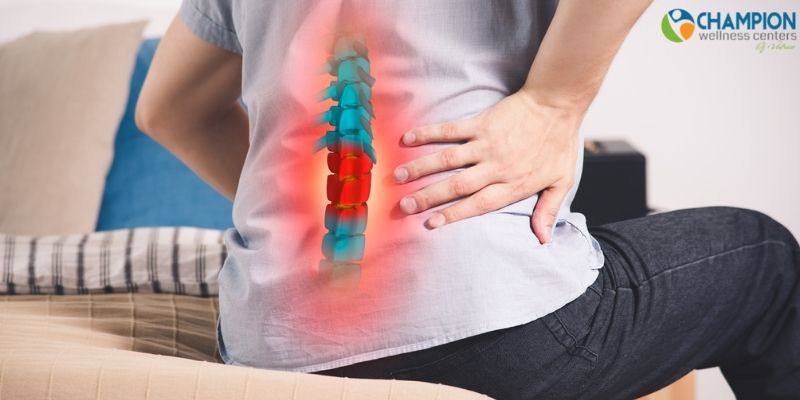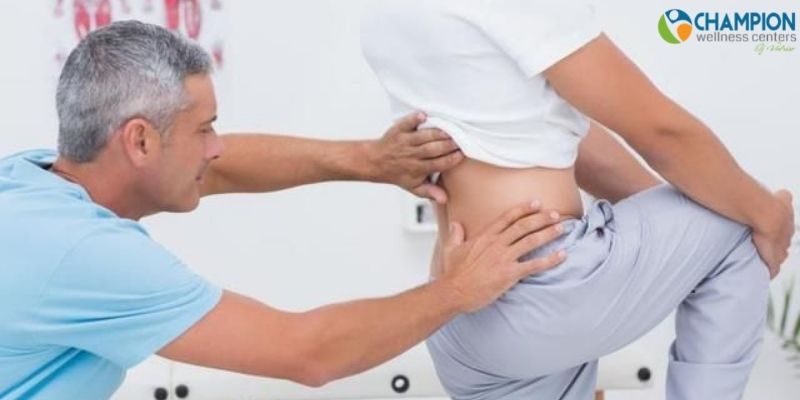There is a small bone that forms a part of the pelvis. This bone is known as the tailbone or coccyx and is at the end of the sacrum. Sometimes, it is the source of disabling and severe pain. Medically, tailbone or coccyx pain is referred to as coccydynia.
What Are Coccyx Injuries?
The most common way to injure your coccyx is to fall directly on your buttocks. Many people who injure their coccyx feel sharp and immediate pain in the coccyx. This pain often goes away after some time. However, you can severely injure your coccyx when you land directly on it via an accidental fall or slip on the stairs.
When you hit your buttocks on a hard floor, your coccyx can be subluxated or bruised. This impact, as a result, can damage the tailbone, causing pain and discomfort. This pain and discomfort are referred to as coccydynia pain.
Causes Of Coccydynia Pain

In many cases of coccydynia, there is no obvious cause. However, this type of pain is most frequently associated with events like giving birth or falling on your bottom. Injuring your coccyx can make it painful for you to perform simple tasks like sitting, standing, and lying down. Although common in athletes, coccyx injuries can affect anyone who falls down on a hard floor.
Falls are not the only cause of a coccyx injury. Sitting on hard pieces of furniture for long periods of time can cause coccydynia pain. The pain can also affect other areas around your coccyx, causing bodily discomfort.
Furthermore, the surrounding muscles will become stiff when you injure the coccyx. Swelling may happen, and the coccyx may even pull away from its proper position. This causes compression of the nerves in that area. You may experience irritation and inflammation which can cause more discomfort and pain.
How Chiropractic Care Can Help With Coccydynia Pain
Stiff and inflamed muscles surrounding the tailbone are the cause of coccydynia pain. The coccyx may be pulled out of position when it is injured. This misalignment often results in irritation and compressed nerves. Luckily, a chiropractor can help. This can be achieved through the realignment of the displaced bone to ease your pain.
Generally, chiropractic treatment focuses on the proper alignment and health of the spine. This also applies to the coccyx. A chiropractor can help ease the resulting pain through many techniques.
Some of the techniques a chiropractor can employ may include:
1. Spinal manipulation
Spinal manipulation is also known as spinal manipulative therapy. This treatment technique is a procedure where chiropractors use their hands or a device to apply controlled thrust to the joints around your coccyx. Having a chiropractor perform spinal manipulation can help align your displaced coccyx. As a result, you will be relieved from coccydynia pain. The amount of force during spinal manipulation can vary depending on the severity of your coccydynia pain.
2. Hot and cold therapy
Hot and cold therapy is used by chiropractors to enhance the healing process. This technique helps in minimizing inflammation of the injured coccyx and other affected areas. Heat therapy, in particular, will help to improve blood circulation to the affected area surrounding the injured coccyx. The increased temperature will improve muscle flexibility and soothe discomfort.
Cold therapy or cryotherapy works by limiting the flow of blood to the affected area. This results in reduced swelling and inflammation that causes coccydynia pain. Additionally, cold therapy can temporarily reduce nerve activity, thereby relieving pain.
3. Ergonomic adjustments
This is one of the recommendations that a chiropractor may make if you are suffering from coccydynia pain. Ergonomic adjustments can be suggested for both your workplace and at home. For instance, because you sit behind a desk for long hours at work, you might be experiencing pain.
Proper ergonomics through correcting the height of the chair you use, good desk posture, and adequate equipment spacing can help minimize the pain you feel from coccydynia.
4. Use of supportive pillows
While avoiding further injury to your coccyx, making ergonomic adjustments, and applying hot and cold therapy can provide relief from pain, the use of supportive pillows is another recommendation by chiropractors. It is a popular saying that an ounce of prevention is worth a pound of cure, and the use of a supportive pillow, especially if you sit for long periods, will help prevent coccydynia pain.
Adding to ergonomics, there are supportive pillows and back-support cushions that can help keep your spine in a neutral position when seated. As a result, there is reduced tension on your coccyx, thereby minimizing the risk of injury.
Furthermore, there are special supportive pillows to help align the center of your pelvis and the center of your sternum. There are different types of supportive pillows, ranging from organic options to orthopedically designed ones for severe cases.
Importance Of Seeing A Chiropractor For Coccydynia Pain

There are several benefits of seeing a chiropractor that goes beyond helping with coccydynia pain. Chiropractic care is a non-surgical, non-invasive, and natural treatment technique for coccydynia pain and other injuries. Additionally, chiropractic care does not mask the issue but treats the root cause of the pain. This, in turn, offers permanent relief. Your quality of life will be drastically improved if you can live without coccydynia pain and other discomforts.
Conclusion
You should speak with a chiropractor if you have concerns about your tailbone or coccyx. There are instances of severe coccyx injuries that may require that you talk with a surgeon. However, the best help for coccydynia pain is to see a chiropractor. Ensure that you see a chiropractor if you have injured your tailbone to prevent it from getting worse. At Champion Wellness Centers of Valrico, we ensure that you not only gain quick relief from this debilitating pain, but we also provide guidance to prevent its recurrence.
For more info, call Champion Wellness Centers of Valrico at 813-409-3304.



